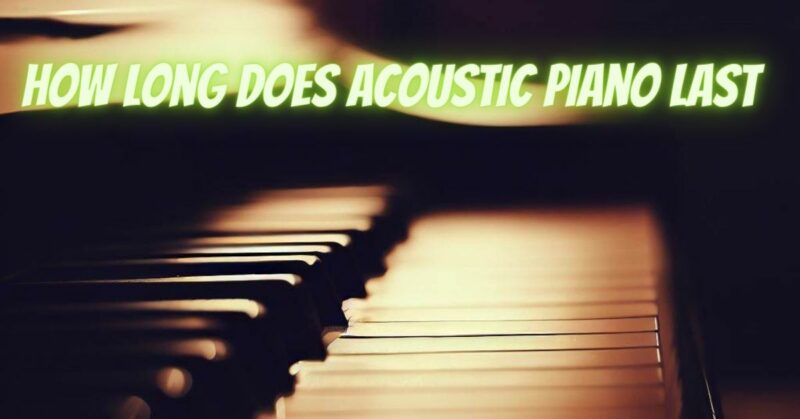Acoustic pianos have long been cherished for their rich, expressive sound and timeless beauty. As a significant investment, many piano enthusiasts wonder about the lifespan of these instruments. In this article, we will explore the factors that influence the longevity of acoustic pianos and provide insights into how long they can last with proper care and maintenance.
- Quality of Construction: The construction quality of an acoustic piano plays a vital role in its lifespan. Well-built pianos, crafted with high-quality materials and precision, have the potential to last for generations. Pianos from reputable manufacturers known for their craftsmanship often exhibit durability and longevity.
- Frequency of Use: The frequency and intensity of piano usage can affect its lifespan. Pianos that are played regularly and receive proper maintenance tend to fare better over time. The consistent playing helps keep the action and moving parts in good condition. Conversely, pianos that remain idle for extended periods may experience issues such as stiff action or deterioration of internal components.
- Environmental Factors: The environment in which a piano resides significantly impacts its longevity. Fluctuations in temperature and humidity levels can cause the wood to expand and contract, leading to structural problems. Ideally, pianos should be kept in a stable environment with controlled humidity (around 40-50%) and away from direct sunlight, drafts, or extreme temperature changes.
- Maintenance and Care: Regular maintenance and proper care are crucial for extending the lifespan of an acoustic piano. This includes tuning the piano at least once or twice a year to ensure optimal sound quality and pitch stability. Additionally, periodic regulation and voicing by a professional technician can address any mechanical or tonal issues and keep the instrument in top condition.
- Wear and Tear: Over time, pianos will experience normal wear and tear, especially in heavily used areas such as the action mechanism, strings, and hammers. However, with proper maintenance and occasional restoration or repair work, these components can be replaced or restored, allowing the piano to continue functioning and sounding great.
- Legacy and Family Heirlooms: Many acoustic pianos become cherished family heirlooms, passed down through generations. With proper care and maintenance, these pianos can last for a remarkably long time, serving as a link to family history and shared musical experiences.
Conclusion:
The lifespan of an acoustic piano is influenced by various factors, including the quality of construction, frequency of use, environmental conditions, maintenance and care, and the possibility of becoming a cherished family heirloom. While it’s challenging to provide an exact number of years a piano will last, a well-crafted acoustic piano can easily span several decades and even centuries with proper care, maintenance, and occasional restoration work. By nurturing and preserving these beautiful instruments, we can ensure their timeless resonance continues to captivate and inspire generations to come.


